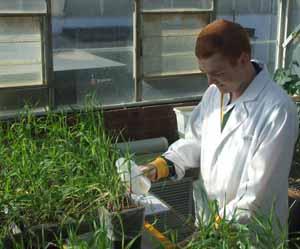In a peaceful glasshouse at Charles Sturt University (CSU), a research student bends over small pots of barley as he poses the big question of whether compost could one day replace synthetic fertilisers to promote plant production.
 The Bachelor of Science (Agriculture) Honours student Mr David Gale maintains it is simply not sustainable for agriculture to continue to rely on chemically produced fertilisers and compost could be the viable alternative.
The Bachelor of Science (Agriculture) Honours student Mr David Gale maintains it is simply not sustainable for agriculture to continue to rely on chemically produced fertilisers and compost could be the viable alternative.“The mining of phosphate needed in synthetic fertilisers cannot continue indefinitely. There is a limited amount of raw material and the process is energy intensive,” said the CSU student.
“In addition, the cost of chemical fertilisers, particularly for farmers in developing countries, is a burden on the sector.”
Mr Gale has been measuring the growth of his barley plants over two months. Some of the pots have been treated with compost, others with a commonly used synthetic fertiliser and others with a combination of compost and synthetic fertilisers.
Originally from Terrigal on the NSW Central Coast, Mr Gale is about to travel to one of the most fertile agricultural regions in the world, the Mekong Delta in Vietnam, in order to validate his findings in the field. Mr Gale will travel to the Mekong Delta region of south Vietnam in late June with his Honours supervisor Dr Jason Condon from the School of Agricultural and Wine Sciences at CSU in Wagga Wagga.
Living on campus at the Can Tho University (CTU) in the Mekong Delta, Mr Gale will continue his research outside the glasshouse at the same time as feeding into a local project on sustainable food production at the CTU.
“Ultimately my research project is about finding ways to sustainably produce enough food for communities around the world, which is something I am very passionate about,” Mr Gale said.
While Mr Gale will remain in the region until October, Dr Condon and 18 Bachelor of Agricultural Science students from CSU in Wagga Wagga will spend a fortnight in the Mekong Delta for a study tour.
The group will look at animal production, including pigs, fish, crocodiles, rabbits and poultry, as well as fruit and rice production.
“This is the second successive year Charles Sturt University has been involved in the study tour to Vietnam. The exposure of the students to different cultures and agriculture is very rewarding as they prepare to embark on their careers in agriculture,” Dr Condon said.





Social
Explore the world of social